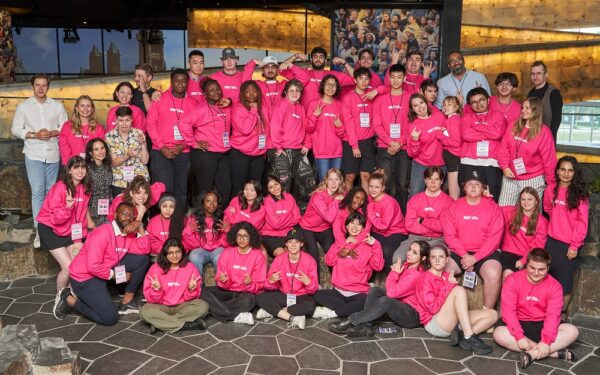
October is not just the season of pumpkin spice lattes and cozy sweaters, it’s also Cybersecurity Awareness Month. While CIRA’s 2023 Cybersecurity Survey shows that ransomware attacks and the dangers of AI grab headlines, the emotional and mental safety and wellness of children is another key online safety concern. And it was top of mind for faculty at Simon Fraser University (SFU) Surrey – TD Community Engagement Centre in British Columbia when they developed their Empower MEdia project.
The Centre has a longstanding relationship with the Surrey School District, working in partnership to develop programming that meets specific local needs, especially for youth and newcomers to Canada. Rachel Nelson, Associate Director, Partnerships and Programs with SFU’s Office of Community Engagement, is an enthusiastic advocate for bridging the gap between academia and community. “The overall goal of the Centre is to work together with our community partners to share our collective knowledge and resources, and to take action on pressing challenges,” Rachel said.
Teachers and staff in the district identified a need to address digital citizenship in their students: using the internet positively, responsibly and safely. This was brought to the forefront during the pandemic when students were required to engage more with technology. Rachel applied for a CIRA Net Good Grant in 2022 to develop a new digital citizenship program alongside the Surrey School District Community School’s Partnership Department. The result was Empower MEdia, a free after-school program for Surrey students in grades 5-7.
The program saw 25 bright minds from a local elementary school participate over eight weeks. Kids aged 10-13 were chosen because they often receive their first devices at that age, diving into the digital world for school and social media. It’s also a key time when their moral reasoning is developing. The school district selected children who would benefit most from the program—newcomers and those facing socio-economic barriers to after-school programming.

The curriculum, developed by SFU’s Faculty of Education, is rooted in the Digital Media Literacy Framework by MediaSmarts. Rachel explained, “Our faculty did a lot of work to make empowerment the focus of the curriculum, as opposed to fear,” which is a more common approach. Topics included health and well-being online, privacy, safety, cyberbullying, news and media literacy and social media wellness. The goal of the program was to nurture children’s confidence and decision-making skills while navigating the internet—and to have a lot of fun.
One uniquely successful component was the involvement of high school and post-secondary students as volunteer mentors. They played a vital role, leading small group discussions and helping the younger students with the technology. “The mentors really enjoyed the program, connecting with the kids and seeing their growth through the program,” Rachel reported. “It was a learning opportunity for the mentors as well as the kids.” The students particularly valued getting to connect with their peers and mentors in person, rather than online, to engage in conversations and ask questions.
The program was more than just presentations and discussion; it was also hands-on and interactive. The kids used tools like Canva to craft memes and Minecraft Education to engage in learning creatively. “While having discussions about online safety topics, they also got the chance to apply their learning and be creative. Bringing in interactive and engaging components was essential,” Rachel said.
Meredith from SD36 Community-Schools Partnership added, “Developing critical thinking skills, a positive mindset and digital skills is at the core of the program. The fact that the students love the exploration and the mentoring relationship is what really brings students back week to week.”

Program staff were especially impressed at the students’ already deep understanding of digital citizenship. Their critical thinking skills were well advanced, and they could articulately express their feelings with the support of their mentors. As the program progressed, they became more open and confident talking about issues related to digital citizenship and connecting those issues back to their daily lives.
A case in point: one student experienced cyberbullying during the course of the program. “Because of what they had learned, they knew exactly what to do,” Rachel shared. “They were able to gather the information and report it, and the bully faced consequences. That was a huge impact.”
The program’s curriculum has even garnered interest from other local school districts. To meet this growing need, a curriculum resource package has been developed to share with educators who are interested in implementing digital citizenship education into their classrooms or after-school programs.

What’s next for Empower MEdia? The program has been such a success that it will run again during the 2023-2024 school year. Rachel shared that having CIRA as the program’s inaugural funder was a catalyst for additional financial support, allowing the program to continue. CIRA is proud that our Net Good Grants program plays a part in helping a community-led online safety project like Empower MEdia make an impact.
To learn more about CIRA’s Net Good Grants program and how you can apply for funding, visit our website.
Caitlin is part of CIRA’s Net Good team as Grants Coordinator. Her background is in the charitable sector, and she is passionate about funding digital equity.





